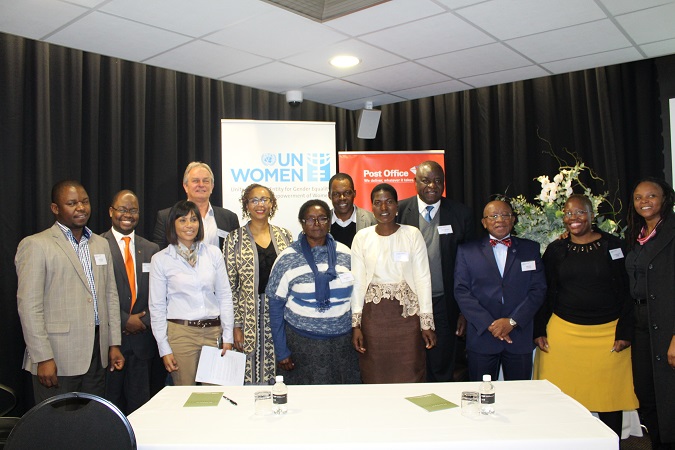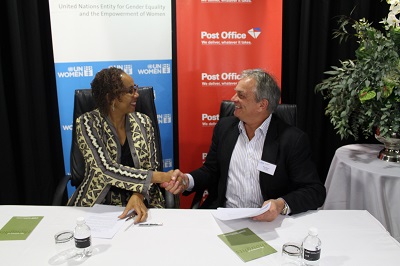Unlocking Opportunity: UN Women South Africa MCO and South African Post Office Partner to Provide Digital Literacy Training
Date:

On Friday, June 3, UN Women South Africa Multi-Country Office (SAMCO) hosted an event to celebrate the signing of an memorandum of understanding between SAMCO and the South African Post Office (SAPO).
The MOU forms the basis of a programme that will turn post office buildings across the country into enterprise hubs equipped with computers and internet access. The hubs will offer digital literacy skills training to women, especially entrepreneurs living in rural areas, as well as offering a platform to connect to financial information and services. The programme aims to train ten thousand women.
Guest speakers included Chief Executive Officer of the South African Post Office, Mark Barnes, UN Women SAMCO Representative Anne Githuku-Shongwe, Food And Agriculture Organisation South Africa Representative Dr. Tobias Takavarasha, and the 2015 Department of Agriculture, Forestry and Fisheries (DAFF) Female Entrepreneur of the Year, Ms Julia Shungube.
Ms. Githuku-Shongwe in her speech at the event stressed the importance of women’s economic empowerment to growing South Africa’s Economy. Citing McKinsey’s “Women Matter” report, Ms. Githuku-Shongwe said, “If women were to play an identical role to men in markets -- and I’m not saying we want to wear your pants, but rather that we want to work side by side with you - as much as US$28 trillion or 26 percent of the global GDP, would be added to the global economy by 2025. So projects like this are not something we do to be kind to women. Gender equality and women’s economic empowerment is an economic imperative. ”

Mr Barnes stressed the importance of people and businesses alike to embrace the digital world : “Every piece of our work has connectivity to technology and a destination. And that destination is always person. The one thing that every tiny town -- and every huge city -- in South Africa has is a Post Office. We have a very wide reach and we want to use that to teach women how to access services. If you’re not comfortable with the digital world you will get left behind.”
The MC for the event, SAPO’s Group Executive of Corporate Affairs, Twiggs Xiphu added that, in addition to SAPO’s more than 2000 points of contact around the country, they have a responsibility, given to them by the Electronic Communications Act, to be key electronic communications provider.
FAO has been involved with another stage of the project which focussed specifically on teaching rural women farmers digital literacy skills. Dr. Takavarasha stressed the need for farmers to have access to digital tools and to know how to use them: “The Post Office is a key partner as they are easily accessible to the rural population. And using those post offices to teach digital literacy skills to women brings those services even closer – to their pockets. Climate change is devastating the region and strengthening the call for climate-smart agriculture. Now more than ever we need to keep farmers up to date and make farming practices sustainable -- and that means that they must be gender-sensitive, too.”
Finally, before the MOU between UN Women SAMCO and SAPO would be signed, it was time to hear from someone who was a farmer and entrepreneur herself. Ms Shungube grows Jatropha trees to make Umhlafusha Oil which she sells for people to use as treatment for stretch marks, baby moisturiser and other ailments. Ms. Shungube had also been part of the FAO and UN Women SAMCO digital literacy training for women farmers last year, and thanked the two agencies, saying “I want to thank you for taking me from zero to ten. When I started the training, I didn’t want to know about computers. But now I want to use it to check everything, to Google, to talk to people in other countries – the first day I did the training I received an email from Cameroon but I didn’t know how to answer it. And now I know. To everyone involved, thank you. I have gone from being a security guard to the owner of my own business.”
The MOU was then signed by Ms. Githuku-Shongwe and Mr. Barnes before refreshments were served. In addition to creating enterprise hubs where people living in rural areas can connect to information and training, the project will help participants to unlock economic opportunities such as public and private procurement and financial services, offering training in completing documentation such as grant applications and registration forms. The programme will ultimately be rolled out in each of South Africa’s nine provinces.